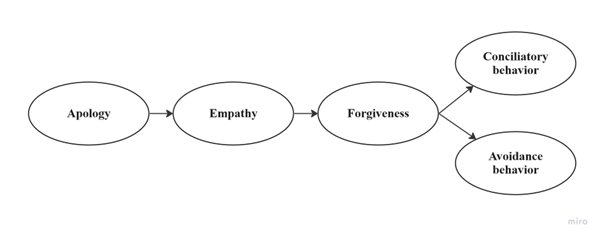Forgiveness
Strong Evidence for the Link Between Empathy and Forgiveness
Summarizing our Replication Registered Report of McCullough et al.
Posted April 11, 2024 Reviewed by Tyler Woods
Key points
- Our ability to forgive others is closely tied to the level of empathy we feel towards them.
- We conducted a replication of McCullough et al. (1997) and the empathy model of forgiveness.
- Replication was done as a Registered Report with Peer Community in Registered Report, a revolution in science.
This post was written by Timothy Chan, a graduate of the University of Hong Kong who led the replication of the classic McCullough et al. (1997; 1998) discussed in this post. Gilad Feldman was Timothy's thesis advisor, is the corresponding author on the joint article, and edited this post for Psychology Today.
We are all familiar with the concept of forgiveness, but what leads us to forgive someone who has hurt us deeply? This question has fascinated countless scholars, theologians, and even psychologists. Some propose that we require a motive to forgive, while others suggest that receiving an apology from the offender is necessary for forgiveness.
The empathy model of forgiveness
In 1997, Prof. McCullough and his colleagues proposed the empathy model of forgiveness, which has been one of the most widely cited models in the field of psychology when it comes to explaining why we forgive. The essence of this model is straightforward.
Forgiveness is not an instant process. Instead, our ability to forgive others is closely tied to the level of empathy we feel towards them. The conscious decision to forgive is strongly influenced by the emotion of empathy we experience towards the person who has wronged us. The figure below illustrates the original empathy model of forgiveness.

Empathy acts as a mediator between dispositional and environmental variables, influencing their causal effects on forgiving. Also, forgiveness represents a motivational shift that encourages constructive actions, such as conciliation towards the offender, while discouraging destructive actions, such as avoidance, following an interpersonal offense.
The theory sounds straightforward, and it has been scientifically tested by McCullough and his colleagues. I believe you might wonder why we replicated a research study that was conducted two decades ago instead of pursuing a novel research topic.
The replication crisis in science
I want to bring your attention to one of the most pressing and concerning issues for the scientific community: the replication crisis. Replicability is a cornerstone of modern science, ensuring its reliability and credibility. However, in the past decade, we realized that we cannot replicate many of the findings in published articles.
In the field of psychological science, many psychologists have been working to rebuild the credibility of the discipline as part of a "science reform" movement. New initiatives like the Center of Open Science and several "Many Labs" mass-scholar collaborations began a systematic attempt to replicate some of the classic studies in the field that were considered solid and heavily cited in influential research. To the community's surprise, many of the classics in reputable journals did not replicate well, with many showing much weaker effects compared to the published articles (Feldman, 2023). These prompted other fields to embark on similar initiatives, with the most recent disappointing findings from cancer biology, which has very low reproducibility and replication rates (Errington et al., 2021).
How I embarked on my journey of replication studies
One of the professors at the University of Hong Kong, Gilad Feldman, set up the CORE team (Collaborative Open Science and Meta-Research), and with students in his classes and under his supervision, the team conducted over 120 replications of classics in social psychology and decision-making.
When I first learned about this crisis in Gilad’s lecture as an undergraduate student, I was genuinely shocked. It made me realize that many theories I learned in my introductory psychology courses could be groundless. Yet, these theories are still presented as "truths" in psychology that students are expected to memorize. Subsequently, I explored if there was anything I could do to change the situation. That's when I decided to conduct a replication study as my thesis, under Gilad’s supervision.
I reviewed numerous classic studies in the field of social psychology that had not been directly replicated before but were frequently cited in other journals, or even served as the foundation for many other theories. Finally, I decided to replicate and extend two significant papers published by McCullough and his team in 1997 and 1998, which focused on explaining interpersonal forgiveness.
In our replication, we followed the original study’s plan in data collection and examined the correlations among variables. We also added an extension, aiming to go beyond correlational evidence to achieve a randomized experiment. We, therefore, manipulated affective empathy in recall tasks, examining the causal relationship between empathy and forgiveness.
Result: A highly successful replication and extension study
This replication was highly successful, and the results aligned closely with the original research: Empathy was positively associated with forgiveness. Apology was positively associated with empathy. The association between forgiveness and conciliation motivation was weaker than in the original article. However, the correlation between forgiveness and avoidance motivation remained about the same in the replication. Furthermore, forgiveness was negatively associated with revenge motivation.
In our extension, we found support for the causal influence of empathy on forgiveness. Additionally, through the manipulation of emotional empathy, we also found support for the causal influence of empathy on the perception of apology, providing scientific evidence for the role of empathy in shaping how individuals perceive apologies.
Publishing registered reports with Peer Community in Registered Reports (PCI-RR)
Lastly, I would like to share my experience of conducting a replication study as a Registered Report with "Peer Community in Registered Report" (PCI-RR).
Registered Reports are a publication process now adopted by over 350 journals in psychological science and beyond, in which Stage 1 journal peer review occurs on a pre-registration plan prior to any data collection. Once the preregistration passes peer review and is approved, the journal grants authors an in-principle acceptance, guaranteeing the publication of the article provided that data collection and analysis follow the intended plan. This emphasizes design, methods, and rigor, addressing issues of reviewers' and publication bias with the publication of findings regardless of data collection outcomes, with the Stage 2 peer review focused solely on ensuring adherence to the Stage 1 plan (or documenting deviations).
PCI-RR is a new initiative launched in 2021 that builds on Registered Reports and is aimed at further improvement. It provides community open-identified peer-review on posted Registered Report Stage 1 preprints, led by open-science trained recommenders (editors), with in-principle acceptance from the community endorsed for publication by a variety of open-science supportive journals. This initiative also includes an option for a "scheduled review" path which allows timely community expert open-science supportive peer review within two weeks, short enough to fit into an academic year thesis schedule. PCI-RR is nothing short of a revolution in science.
My fellow undergraduate guided thesis students and I, working with Gilad Feldman, submitted our theses to PCI-RR and have been accepted for publication following the community's approval of our pre-registration plan.

The Best Learning Experience for Researchers
PCI-RR has profound implications for our research community, and I believe it is one of the best learning experiences for all early career researchers. Through PCI-RR, we can receive direct feedback from field experts regarding the research plans. This feedback not only provides constructive criticism (which, although sometimes critical, is essential for improvement) but also occurs at an early stage when we can still address issues and improve.
Throughout this amazing journey, I am grateful to have a chance to engage in direct conversations and learn from all the outstanding researchers, authors, and reviewers. Their expertise positively influenced my understanding of psychological science. Completing my thesis as a Registered Report on replication provided me with invaluable knowledge, reinforcing my commitment to endorse true open science. Let's continue to prioritize transparency, exercise caution, and approach our work with confidence and humility.
For more information, please see my talk about the project and a thesis as a submission to PCIRR:
References
Chan, C., & Feldman, G. (2024). The impact of Empathy on Forgiveness: Replication and extensions Registered Report of McCullough et al. (1997)'s Study 1. Endorsed by Peer Community in Registered Reports. DOI: 10.24072/pci.rr.100444
[PCIRR Stage 2 recommendation/Open peer review] [PCIRR Stage 1 recommendation/Open peer review] [Preprint] [Open materials/data/code]
McCullough, M. E., Worthington, E. L., & Rachal, K. C. (1997). Interpersonal Forgiving in Close Relationships. Journal of Personality and Social Psychology, 73(2), 321–336. https://doi.org/10.1037/0022-3514.73.2.321
McCullough, M. E., Rachal, K. C., Sandage, S. J., Worthington, E. L., Brown, S. W., & Hight, T. L. (1998). Interpersonal Forgiving in Close Relationships: II. Theoretical Elaboration and Measurement. Journal of Personality and Social Psychology, 75(6), 1586–1603. https://doi.org/10.1037/0022-3514.75.6.1586
Errington, T. M., Mathur, M., Soderberg, C. K., Denis, A., Perfito, N., Iorns, E., & Nosek, B. A. (2021). Investigating the replicability of preclinical cancer biology. Elife, 10, e71601. https://doi.org/10.7554/eLife.71601
Feldman, G. (2023). "Time for a science reform". Talk given at University of Hong Kong. https://doi.org/10.17605/OSF.IO/2CTFJ




